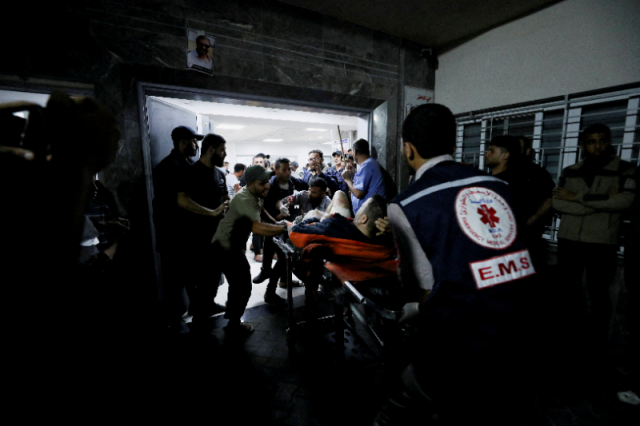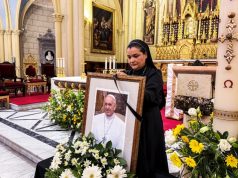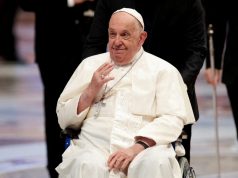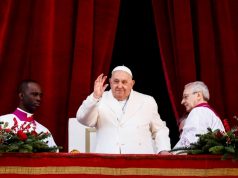
- Hundreds of Palestinians dead, health authorities say
- Palestinians, Israelis blame each other
- Israeli military faults failed Islamic Jihad rocket launch
- Islamic Jihad spokesman denies being responsible
- Palestinian President Abbas cancels plan to meet Biden in Jordan
- Netanyahu blames ‘barbaric terrorists in Gaza’ for explosion
GAZA — A Gaza health ministry spokesman said hundreds were killed in a blast at a Gaza City hospital on Tuesday that Israeli and Palestinian officials blamed on each other and that ignited protests in the West Bank and around the Middle East.
Health authorities in the Hamas-ruled Gaza Strip said an Israeli air strike caused the blast while Israel‘s military attributed it to a failed rocket launch by the Palestinian Islamic Jihad militant group.
The health ministry spokesman, Ashraf Al-Qudra, said early on Wednesday that hundreds were killed and rescue workers were still removing bodies from the rubble. In the first hours after the blast, a Gaza civil defense chief said 300 people were killed, while health ministry sources put the figure at 500.
Reuters could not independently verify who was responsible for the blast or how many people were killed.
Before Tuesday’s blast, health authorities in Gaza said at least 3,000 people had died in Israel‘s 11-day bombardment that began after a Hamas Oct. 7 rampage on southern Israeli communities in which 1,300 people were killed and around 200 were taken into Gaza as hostages.
Gaza, a 45 km-long (25-mile) enclave home to 2.3 million people, has been ruled since 2006 by Hamas, an Islamist group that is a U.S.-designated foreign terrorist organization.
The blast took place on the eve of a visit by U.S. President Joe Biden to Israel to show support for the country in its war with Hamas and to hear how Israel plans to minimize civilian casualties. One U.S. aim is to keep the conflict from spreading.
Regardless of who is found responsible for the explosion, which Hamas said had killed patients and others left homeless by Israeli bombardment, it will complicate efforts to contain the crisis.
In one sign of this, Jordan’s foreign minister, Ayman Safadi, canceled a summit his country was to host in Amman with Biden and the Egyptian and Palestinian leaders.
In another, Palestinian security forces fired tear gas and stun grenades to disperse protesters in the occupied West Bank city of Ramallah who were throwing rocks and chanting against Palestinian President Mahmoud Abbas as popular anger boiled.
The blast drew condemnation across the Arab world, and protests were staged at Israel‘s embassies in Turkey and Jordan and near the U.S. embassy in Lebanon, where security forces fired tear gas toward demonstrators.
Television footage showed protests in Yemen’s southwestern city of Taz, as well as in the Moroccan and Iraqi capitals.
Lebanon’s Iran-backed Hezbollah militant group denounced what it said was Israel‘s deadly attack on the Al-Ahli al-Arabi hospital in Gaza, run by the Anglican church, and called for “a day of unprecedented anger” against Israel and Biden’s visit.
Claims and counter claims
There were competing claims and denials from Israeli and Palestinian officials over who was responsible.
Abbas said that targeting the hospital was a “hideous war massacre,” adding that “Israel has crossed all red lines.”
Israeli Prime Minister Benjamin Netanyahu blamed Palestinian militants for the explosion.
“The entire world should know: It was barbaric terrorists in Gaza that attacked the hospital in Gaza, and not the IDF,” he said, referring to the Israel Defense Forces. “Those who brutally murdered our children also murder their own children.”
Briefing reporters early on Wednesday, Israeli military spokesperson Rear Admiral Daniel Hagari cast doubt on the Palestinian death count, asserted that there was no direct hit on the hospital, and said Israel had intelligence proving its claim that Gaza militants were responsible.
The IDF blamed Palestinian Islamic Jihad which, like Hamas, is viewed by the United States as a foreign terrorist organization.
“The IDF did not strike the hospital in Gaza,” Hagari said in a video statement. “The hospital was hit as a result of a failed rocket launched by the Islamic Jihad terrorist organization.”
Another IDF spokesman, Lieutenant Colonel Jonathan Conricus, told CNN Israel had intercepted conversations among militants showing “they understand that it was a rocket that misfired.”
He said the Israeli government would share its intelligence with Biden and would make the intercepts public.
Speaking earlier, Daoud Shehab, a spokesman for Islamic Jihad, denied his group was responsible.
“This is a lie and fabrication, it is completely incorrect. The occupation is trying to cover for the horrifying crime and massacre they committed against civilians,” he told Reuters.
During the last Israeli-Hamas conflict in 2021, Israel said Hamas, Islamic Jihad and other militant groups fired about 4,360 rockets from Gaza of which around 680 fell short of Israel and into the Gaza Strip.
Clashes with Palestinian security forces broke out in a number of other cities in the West Bank, which is ruled by Abbas’ Palestinian Authority, late on Tuesday, witnesses said.
After Hamas officials initially blamed Tuesday’s hospital blast on an Israeli air strike, Arab countries, Iran and Turkey swiftly condemned it.
– Reporting by Nidal al-Mughrabi, Bassam Massoud and Nuha Sharaf in Gaza, Ari Rabinovitch, Dan Williams, Henriette Chacar, Dedi Hayun, Maayan Lubell, Emily Rose, James Mackenzie and John Davison in Jerusalem, Humeyra Pamuk in Tel Aviv, Parisa Hafezi in Dubai, Hatem Maher, Ahmed Tolba and Omar Abdel-Razek in Cairo, Trevor Hunnicutt, Nandita Bose, Rami Ayyub and Katharine Jackson in Washington, Michelle Nichols at the United Nations, Writing by Peter Graff, Angus Macswan and Arshad Mohammed; Editing by Mark Heinrich, Howard Goller and Cynthia Osterman









